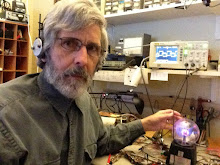Some time ago, a group of hams (including me) celebrated an anniversary of Sputnik I by building transmitters of a similar design and power level. Now it's time to try the first satellite borne transmitter of the USA carried within its Vanguard I spacecraft. This time we use a single transistor instead of a single tube. Specifically, a germanium transistor instead of silicon. The original was on 108 MHz, I think, but that's a bit challenging and that band isn't available to hams. We're using the 20 meter (14 MHz) band. For authenticity, we try to hold to a single transistor, germanium, with output as a result being in the low milliwatt range.
I came a little late to the party this time because I couldn't find a suitable transistor, but eventually was pointed to some on eBay that were from the old Soviet Union. Some kind of irony going on here, I guess. Peaceful co-existence, anyone?
Again, I'm following the trail blazed by Mike, AA1TJ who had the original schematic and made his circuit close to it. I was able to duplicate it pretty well, but my oscillation was slow to start, so keying would be impossible. Impatient, I switch to a circuit from Experimental Methods in RF Design. Here's my circuit:
I measured about 30 mW out from the transmitter, which was pretty much my goal. I haven't yet made my first QSO, but was pleased and a bit amazed to hear my signal (from Arkansas) reported on the Reverse Beacon Network in WVA, VA, NC, OH, and PA after just a few CQs, typically 8 to 10 dB above the noise. Update: Just had a partial QSO with WD4HHN in Florida, so things are moving. I'm not one of those QRP operators of great faith, so I have to admit I'm amazed. It's fun writing in the log, Power: 0.03 W.
Not wanting to have to pound on a hand key, I also made an interface circuit to my electronic keyer using a 2N4403 PNP transistor switching the positive lead from the battery.
The transmitter went together in an hour or so on a solderless prototype board, photo below:
The silver cap thing is the transistor. The crystal is wrapped in red tape to keep its case from shorting out any adjacent wires.
Here's a page on Vanguard activities maintained by Oleg Borodin, RV3GM.
http://www.club72.su/vanguard.html
And here's Michael Rainey's blog entry on his Vanguard project from June, 2012:
http://aa1tj.blogspot.com/2012_06_01_archive.html
72-
Nick, WA5BDU
Saturday, March 23, 2013
Subscribe to:
Comments (Atom)


